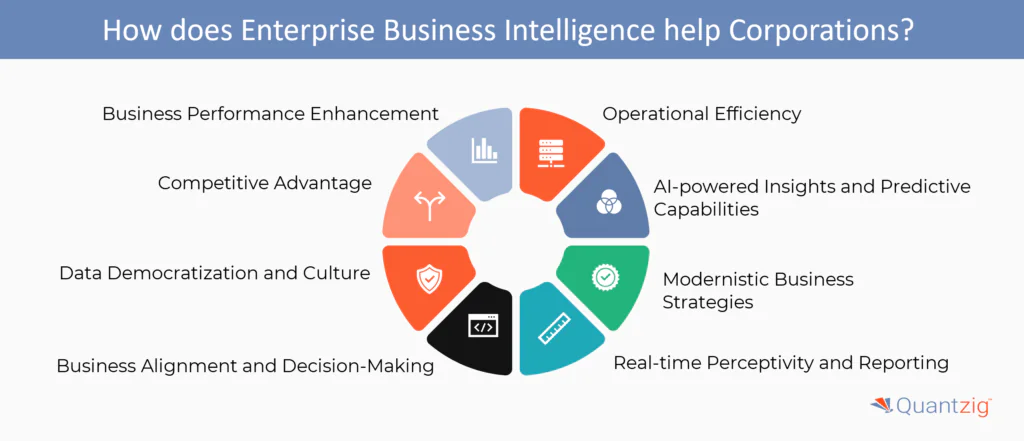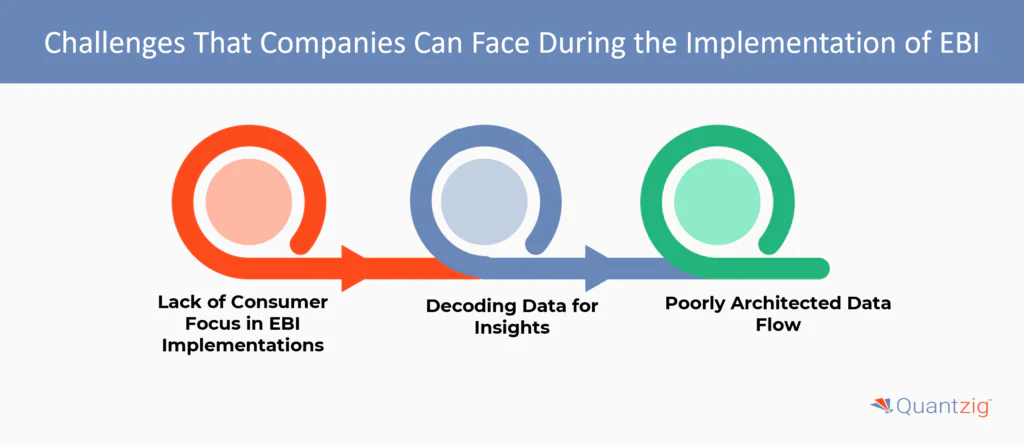Enterprise Business analytics offers valuable insights that help organizations make informed decisions and drive value. However, the challenge lies in gathering insights from diverse data sources and presenting them in a clear, actionable format.
This is where business intelligence (BI) comes in. BI platforms provide seamless access to interconnected data sources, enabling businesses to visualize and act on insights. By leveraging comprehensive BI solutions, organizations can drive success through informed, data-backed decisions.
Key Benefits of Enterprise BI:
- Seamless Data Integration: Access and analyze data from multiple sources.
- Enhanced Visualization: Simplified data presentation for better decision-making.
- Improved Decision-Making: Data-driven insights lead to more informed strategies.
Quantzig’s BI solutions empower businesses to overcome data challenges, enabling faster, smarter decisions for long-term success and better enterprise business analytics.
Book a demo to experience the meaningful insights we derive from data through our ai capacity planning analytical tools and platform capabilities.
Request a DemoTable of Contents
Benefits of Enterprise Business Intelligence in Today’s Business
Enterprise Business Intelligence (EBI) is essential for gaining a competitive edge and achieving sustainable growth. By integrating data governance, robust infrastructure, and advanced visualization techniques, EBI extracts actionable insights from vast datasets. This holistic approach streamlines data collection, enables seamless integration, customer behaviors and enhances operational efficiency through predictive forecasting, driving innovation and shaping a data-driven future for businesses.
- Improved Decision-Making: EBI provides real-time data, enabling faster, informed decisions through easy-to-read visuals like graphs and charts. It guides key areas such as pricing, marketing, and operations for data-driven choices.
- Reduced Risks: EBI helps identify risks by analyzing operational and financial data, ensuring early detection of inefficiencies and compliance issues, reducing costly errors.
- Fostering Innovation: EBI drives innovation using AI Analytics and cloud tools, uncovering market trends and competitor insights, enabling confident product development and market expansion.
Quantzig’s EBI solutions enhance decision-making, mitigate risks, and drive innovation for business success, empowering organizations with meaningful enterprise business insights.
Experience the advantages firsthand by testing a customized complimentary pilot designed to address your specific capacity planning requirements. Pilot studies are non-committal in nature.
Request a free pilotHow can Enterprise Business Intelligence benefit corporations?
Business Intelligence (BI) plays a crucial role in enhancing corporate operations and decision-making processes by leveraging data-driven insights. Here’s how it helps corporations in various aspects:

| Benefit | Description |
|---|---|
| Business Performance Enhancement | Enterprise BI integrates data from various sources, offering a clear view of KPIs to identify areas for improvement. |
| Operational Efficiency | Streamlines data processes and automates tasks, boosting productivity and reducing manual efforts. |
| Competitive Advantage | Enables data-driven, real-time decision-making to help corporations stay ahead in the market. |
| AI-powered Insights & Predictive Capabilities | AI integration enhances analysis, revealing hidden data patterns for better decision-making and strategic planning. |
| Data Democratization | Fosters a collaborative, data-driven culture by democratizing access to insights across all levels of the organization. |
| Modern Business Strategies | Empowers corporations to develop forward-looking strategies using interactive visualizations and data storytelling. |
| Business Alignment | Ensures that business strategies align with goals through data-driven insights that enable agile decision-making. |
| Real-time Insights | Offers immediate insights through real-time data processing for faster identification of trends and issues. |
Enterprise Business Intelligence is transforming how corporations make informed decisions, enhance performance, and maintain a competitive edge. As experts in BI, Quantzig provides comprehensive solutions that empower businesses to leverage data for maximum impact.
Get started with your complimentary trial today and delve into our platform without any obligations. Explore our wide range of customized, consumption driven analytical solutions services built across the analytical maturity levels.
Start your TrialPotential Challenges Companies May Encounter During Enterprise Business Intelligence (EBI) Implementation

1. Lack of Consumer Focus in EBI Implementations:
In many EBI implementations, the primary focus tends to be on data presentation rather than delivering actionable insights to end-users. This oversight can lead to an overwhelming influx of data without context or relevance. When consumers are bombarded with raw data rather than curated insights, it can hinder decision-making rather than facilitate it. To maximize the impact of EBI and extract true enterprise business insights, it’s imperative to align data visualization and reporting with the specific needs and objectives of the end-users. This ensures that data is transformed into meaningful insights that empower informed decision-making, making it a pivotal aspect of successful EBI implementation.
2. Decoding Data for Insights:
Analysts often spend a significant amount of time deciphering complex datasets to extract valuable insights or recommendations. This manual decoding process is not only time-consuming but also prone to errors. Efficient EBI should streamline this process, automating data analysis and presentation. By reducing the effort required to derive insights, EBI liberates analysts to focus on higher-value tasks such as strategic analysis and decision support, significantly boosting productivity and the quality of recommendations.
3. Poorly Architected Data Flow:
The architecture of data flow within EBI systems is critical. If not designed and optimized correctly, it can lead to slow and unresponsive Business Intelligence (BI) dashboards. A sluggish dashboard experience frustrates users and can discourage consumption, rendering the EBI system ineffective. To mitigate this issue, data architecture should prioritize performance and responsiveness. This includes considerations such as data optimization, efficient querying, and responsive dashboard design. A well-architected data flow ensures that users can access insights swiftly and seamlessly, enhancing their overall experience and encouraging continued usage of the EBI platform.
How Quantzig Can Help with Enterprise Business Intelligence?
Quantzig offers comprehensive Enterprise Business Intelligence solutions designed to transform raw data into actionable insights for incurring customer satisfaction. With expertise in predictive analytics, data management, and advanced visualizations, we help corporations optimize decision-making processes through the following services:
| Quantzig’s BI Solutions | Description |
|---|---|
| Predictive Analytics Expertise | We leverage AI/ML models to forecast future business outcomes, enabling more informed decision-making. |
| Comprehensive Data Management | Our end-to-end data management solutions ensure data quality, integrity, and seamless integration across all systems. |
| Interactive Visualizations | Quantzig’s customized visualizations empower your teams to explore data intuitively, enhancing insights through dynamic dashboards. |
| Cloud-Enabled BI Solutions | We provide scalable, flexible cloud deployment options, ensuring that businesses of any size can benefit from enterprise-level analytics and accessibility. |
| Data Modeling & Preparation | We assist in structuring and preparing your data for analysis, ensuring optimal efficiency and accuracy in data-driven initiatives. |
| Advanced Analytics & Processing | Quantzig offers robust analysis and processing capabilities, turning large datasets into clear, actionable insights that drive business performance. |
| Customized Reporting & Dashboards | Our team develops tailored reports and dashboards, offering advanced visual insights to support data-driven decision-making. |
| Ongoing Support & Consulting | Quantzig provides end-to-end support, from platform setup to ongoing training and consulting, ensuring you fully leverage your BI investments. |
With Quantzig as your Enterprise BI partner, you’ll unlock the power of your data to make more informed decisions, drive efficiency, and achieve your business goals.on.
Experience the advantages firsthand by testing a customized complimentary pilot designed to address your specific capacity planning requirements. Pilot studies are non-committal in nature.
Request a free pilotConclusion:
In essence, it’s not just about data; it’s about turning data into actionable insights. Enterprise Business Intelligence empowers organizations to uncover new opportunities, mitigate risks, and drive efficiency. It goes beyond traditional analytics, acting as a strategic driver for growth and innovation. In a business environment where agility and precision are critical, EBI serves as the guiding force for achieving objectives. Its impact is not only immediate but also future-focused, providing the enterprise business insights needed for sustained success. EBI is more than just a tool—it’s a competitive edge that secures long-term relevance and growth through strategic business intelligence for enterprise solutions.





